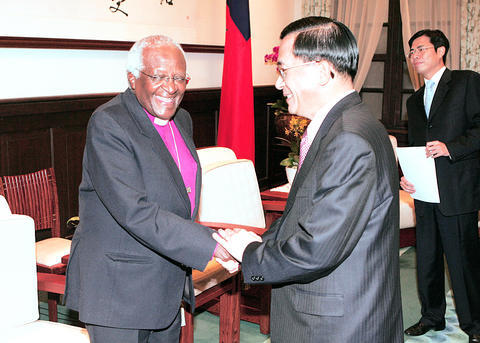True repentance and acknowledgement of mistakes is the key to reconciliation and forgiveness, but it is a long journey, Desmond Tutu, Nobel Peace laureate and former Anglican archbishop of South Africa, said yesterday.
In a symposium on "transitional justice and fusion of national ethnicities" hosted by the Taiwan Foundation for Democracy, Tutu shared South Africa's experiences with reconciliation and healing after the end of apartheid.
Tutu, who arrived in Taipei last Tuesday, said that he had witnessed the efforts of Taiwanese to emerge from the shadow of the nation's past. He praised the tolerance of the nation's political victims in their struggle for justice.

PHOTO: WALLY SANTANA, AP
"We bring a humble mind to Taiwan and share our experiences to you. Some of the experiences might be useful to Taiwan but it is up to you to decide what suits Taiwan," Tutu said.
"An eye for an eye will make all the people blind," he said, adding that reconciliation is a long journey.
"We must learn how to forgive," he said.
Tutu also talked about his meeting with former Democratic Progressive Party (DPP) chairman Lin I-hsiung (
Tutu said it was tragic that the Lin murders remained unsolved.
Tutu emphasized the importance of taking positive steps toward transitional justice, instead of feeling lost in sorrow and anger.
In South Africa, some people insisted on arresting perpetrators and bringing them to trial, following the pattern of the Nuremberg trials after World War II. Tutu said, however, that this method was unproven in helping a nation heal.
"It is a too heavy burden to the judiciary system and the police knows how to eliminate evidence. Besides, the legal process is so long that [it] turns the media chilly to the victims. A court is a very emotionless place," Tutu said.
After the end of apartheid in 1994, the government announced an amnesty for those who committed certain crimes under the apartheid era, provided that the perpetrators admitted their crimes.
Although the deal was criticized as being too easy on violators of human rights, confessing their crimes proved very difficult, Tutu said.
"Making a confession in public is actually a big punishment. It is not a traditional way of punishment," Tutu said.
He also encouraged victims and their families to tell their stories because they could be very good lessons for society to learn about the price they paid in their struggle for freedom.

An essay competition jointly organized by a local writing society and a publisher affiliated with the Chinese Communist Party (CCP) might have contravened the Act Governing Relations Between the People of the Taiwan Area and the Mainland Area (臺灣地區與大陸地區人民關係條例), the Mainland Affairs Council (MAC) said on Thursday. “In this case, the partner organization is clearly an agency under the CCP’s Fujian Provincial Committee,” MAC Deputy Minister and spokesperson Liang Wen-chieh (梁文傑) said at a news briefing in Taipei. “It also involves bringing Taiwanese students to China with all-expenses-paid arrangements to attend award ceremonies and camps,” Liang said. Those two “characteristics” are typically sufficient

A magnitude 5.9 earthquake that struck about 33km off the coast of Hualien City was the "main shock" in a series of quakes in the area, with aftershocks expected over the next three days, the Central Weather Administration (CWA) said yesterday. Prior to the magnitude 5.9 quake shaking most of Taiwan at 6:53pm yesterday, six other earthquakes stronger than a magnitude of 4, starting with a magnitude 5.5 quake at 6:09pm, occurred in the area. CWA Seismological Center Director Wu Chien-fu (吳健富) confirmed that the quakes were all part of the same series and that the magnitude 5.5 temblor was

The brilliant blue waters, thick foliage and bucolic atmosphere on this seemingly idyllic archipelago deep in the Pacific Ocean belie the key role it now plays in a titanic geopolitical struggle. Palau is again on the front line as China, and the US and its allies prepare their forces in an intensifying contest for control over the Asia-Pacific region. The democratic nation of just 17,000 people hosts US-controlled airstrips and soon-to-be-completed radar installations that the US military describes as “critical” to monitoring vast swathes of water and airspace. It is also a key piece of the second island chain, a string of

The Central Weather Administration has issued a heat alert for southeastern Taiwan, warning of temperatures as high as 36°C today, while alerting some coastal areas of strong winds later in the day. Kaohsiung’s Neimen District (內門) and Pingtung County’s Neipu Township (內埔) are under an orange heat alert, which warns of temperatures as high as 36°C for three consecutive days, the CWA said, citing southwest winds. The heat would also extend to Tainan’s Nansi (楠西) and Yujing (玉井) districts, as well as Pingtung’s Gaoshu (高樹), Yanpu (鹽埔) and Majia (瑪家) townships, it said, forecasting highs of up to 36°C in those areas